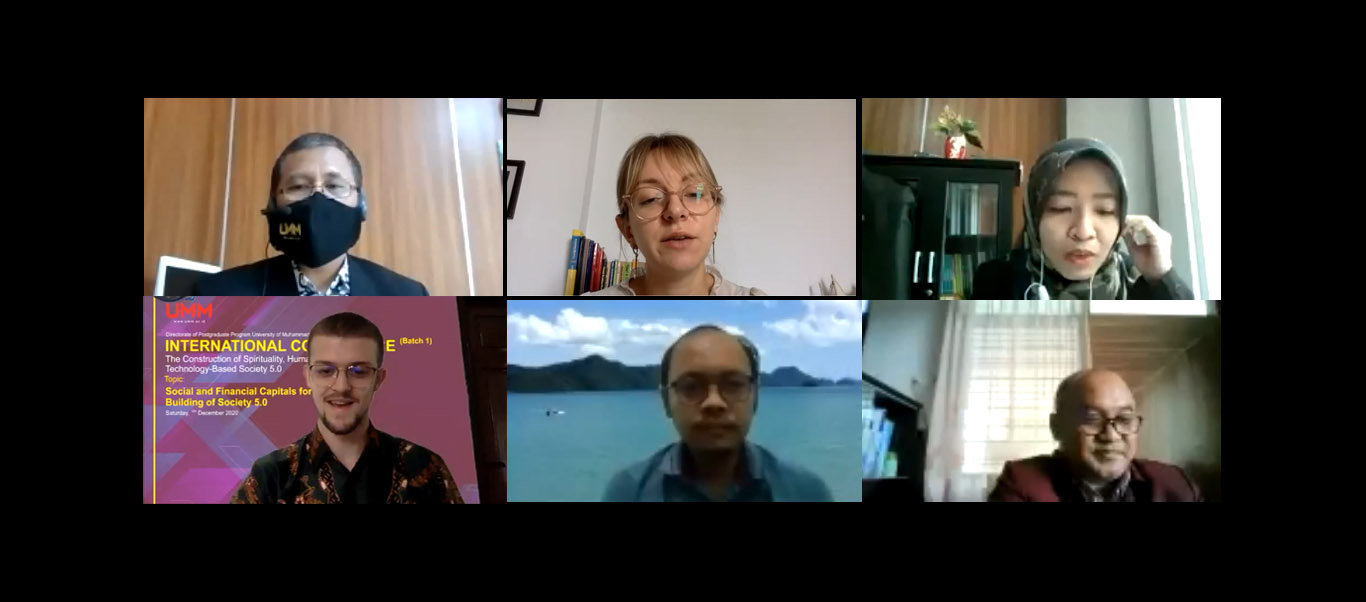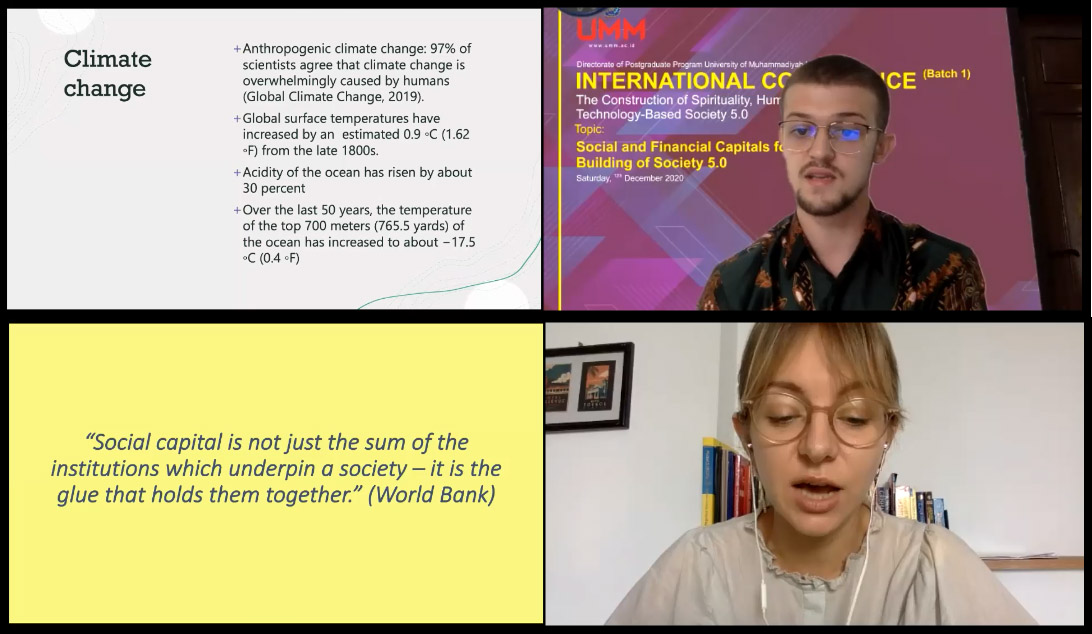
The second batch of online international conference was held by the Directorate of Postgraduate Program (DPPs) of UMM as the continuation of internationalization program. Aired on 12 December 2020, this webinar was attended by postgraduate students of UMM from the non-educational cluster. There were five speakers from four different countries, they were, Dr. Widayat and Dr. Eko Handayanto from UMM Indonesia, Dr. Hanif Ahamat from Malaysia, Dr. Mattthew Paul Cant from England, and Ilona Pasteruk from Ukraine. These keynote speakers had delivered different insights about Social and Financial Capitals in building 5.0 society.
Dr. Widayat explained sustainable development goals, which most activities today are held online and human interaction is minimal. We are expected to shift into a cashless society where most transactions use e-money. Dr. Widayat challenged his home country in his presentation, asking, “Is Indonesia ready to take part in Society 5.0?” and further answered, “It may not be. Indonesia is not yet ready.” If Society 5.0 is merely judged based on smartphones-based activities, then the answer is yes. However, Society 5.0 is not only limited to that, but requires financial capital, social capital, technology capital and human capital instead. Indonesia has not yet had these four elements. The country is especially lacked behind in terms of financial technology; while the evolution of human life calls for significant shifting from the traditional way to a smarter technology. It can be said that the supportive ecosystem and mutual collaboration are not yet found among Indonesian society. People should keep in mind that technology is made for humans, and not the other way around because that will not support the advancement of financial technology. “In the end, technology should make life easier and ignite smart society,” concluded Dr. Widayat.
From Malaysia, Dr. Haniff Ahamat explained about the social evolution of humans and political organizations. This grand civilization was started from families, then became groups, forming cities, turning into kingdoms, and today is called countries. This pandemic lets us see if a Head of State is protecting his people or protecting his political power. "We are homo economicus,” said Dr. Ahamat, “The actors of economic activity.” Further, he explained about how law is ignited by economic activities in human’s social groups. “Because social groups are meant to be unbreakable, rules are made. Therefore, our freedom is limited. However, some people don't like rules. Hence, law and morals are needed to regulate our lives to prevent aggression,” he explained chronologically.
Dr. Ahamat also revealed that Indonesia is ruled by the fairest law named Pancasila. Unlike Malaysia that does not have its own law because the country has to follow England. Unfortunately, Indonesia has too many rich people, so the distribution of wealth is not equal, creating a big economic gap. Malaysia, on the other hand, rarely has rich people, so that wealth and prosperity are equal for all people. The condition is more stable because the government regulates Malaysian common welfare. It can be said that inequality occurs when the state is suppressed by business needs, so that people’s welfare is sacrificed. In conclusion, Dr. Ahamat stated that international law begins with a human narrative. The state itself is an abstract entity; humans run it. When humanity does not work, economic justice must play a role. This will lead to a calibration in the digital society.
Ilona Pasteruk juga berdiskusi membahas tentang social & financial capital dalam membangun masyarakat 5.0. yang pertama kali digagas oleh Jepang pada 2016 dimana pondasi dasarnya adalah sains, teknologi dan inovasi. “Kenapa ada negara maju dan berkembang?” tanya Ilona. Ternyata hal itu tidak semata-mata dipengaruhi besar/ kecilnya sebuah negara. Contohnya Jepang dan Indonesia. Mereka memiliki perbedaan lingkungan dan dukungan. Jepang negara berukuran lebih kecil namun Sumber Daya Alam (SDA) nya sedikit dan alamnya lebih menantang sehingga orang Jepang selalu berinovasi. Sedangkan Indonesia berukuran besar, SDA melimpah sehingga Sumber Daya Manusia (SDM) kurang merasa tertantang dan lambat berinovasi.
Ilona Pasteruk from Ukraine discussed social & financial capital in building society 5.0. which was first initiated by Japan in 2016. The basic foundation of social & financial capital is the interaction among science, technology and innovation. Miss Pasteruk began her presentation by asking, "Why are there developed and developing countries?". As an answer, she said that it was not solely influenced by the size of a country. Take Japan and Indonesia, for example. They have different environments and supports, where Japan is smaller with more limited natural resources. Hence, the condition becomes more challenging, so that Japanese will always be innovating. On the other hand, Indonesia is a large country with abundant natural resources, leading to a less challenged human resources that do not feel the need to innovate.
There are three social capital concepts, namely natural resources, network structure, and network relationships.” stated Miss Pasteruk. The World Bank considered that social capital is not only an institution that underlies society; but it is the glue that strengthen their relationship. Social capital makes it easy for groups of people to work effectively to achieve common goals. It can be achieved through organizations that do not profit too much, to function together in trust, shared identity, norms, values, and mutually beneficial relationships. Meanwhile, financial capital is the data that connects people. The use of digital currency and alternative forms of digital assets makes it easier for both governments and people to move towards society 5.0.

From the United Kingdom, Dr. Cant explained about the dangers of climate change in era 5.0. Around 97% scientists agree that climate crisis is caused by humans, where the global temperature has increased by 0.9 C, ocean acidity has increased by 30%, and the sea temperature has also increased by -17.5 C. The world’s richest people, which is only 10%, has caused more damage for about 50% for the climate crisis, more than other social groups. Unfortunately, poor people who do not contribute much will be more affected. Hence, the climate crisis will create social economic disparities that hinders the realization of 5.0 society. It is unfortunate that most people today pay too much attention to social and financial capital, but do not realize the importance of stable climate and sustainable nature. If climate stability is not maintained, all human efforts for social and financial progress will not be achieved because there are hardly any habitable regions.
Dr. Cant also elaborated that people from low socioeconomic condition are more prone to the negative impacts of climate crisis. "They will be affected in terms education, mental health, and physical health,” said he, “Unfortunately, there are psychological barriers in overcoming the climate crisis, one of which is short-term interests versus long-term interests. Especially in a democratic country like Indonesia, people ask for visible results, while the government thinks about a long-term plan,” concluded Dr. Cant.
Similar to Dr. Widayat and Miss Pasteruk, Dr. Eko Handayanto from UMM Indonesia emphasized the importance of social capital where human social relationships results on more productive outputs. This is the manifestation of conceptual innovation from the integration of both inter- and intra-disciplinary theories, especially in the fields of sociology and economics. Introduced by Bordieu in 1972, this concept is revived in the current era of 5.0 Society. It is an association between real and potential natural resources in the relation with a long-lasting network of institutional relationships and mutually beneficial introductions. In other words, social capital benefits everyone in a group, providing both capital and credentials that they can recognize in various economic activities. (Dik / Ria)